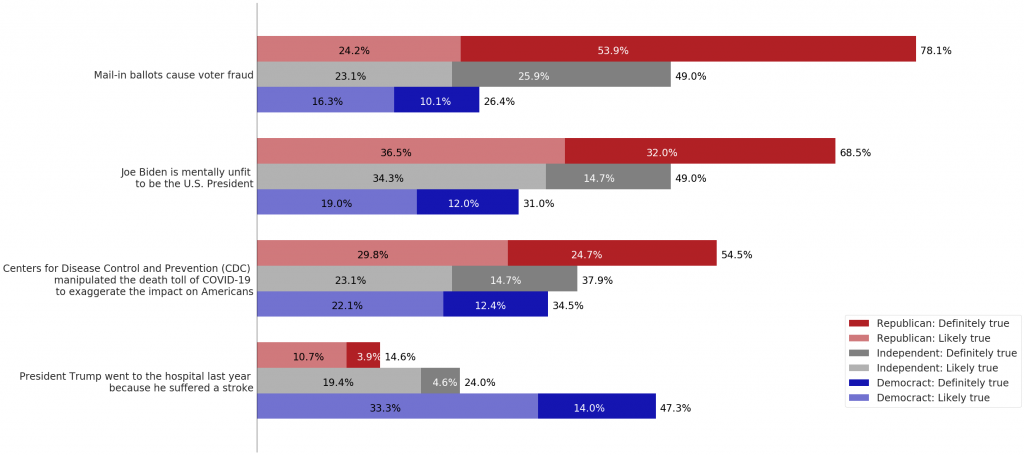Belief in false election narratives transcends party lines, survey shows
| Press Release: The Media School |
|||
|---|---|---|---|
| Contact: | Betsi Grabe Professor The Media School mgrabe@indiana.edu |
James Shanahan Dean The Media School jes30@indiana.edu |
|
For immediate release:
Oct. 5, 2020
BLOOMINGTON, Indiana — President Trump was taken to the hospital after a stroke. The Centers for Disease Control exaggerated the number of COVID-19 deaths. Whether or not Americans believe these false stories may depend on their political affiliation, according to the second in a series of six studies conducted by researchers at Indiana University’s Observatory on Social Media.
The reports are based on the testing of unsupported narratives related to the fall 2020 election. The first study, the results of which were released in September, found almost 80% of respondents were aware of at least one of five false stories through media exposure, and just over 60% believed at least one of those narratives was true.
In the latest survey, conducted in late September, researchers looked further into the correlation between party affiliation and belief in narratives originating from different sides of the political spectrum. Republicans were more likely to believe that the CDC exaggerated the number of COVID-19 deaths, while Democrats were more likely to believe the story about President Trump’s alleged stroke.
Independents ranked between Republicans and Democrats in their belief of false narratives.
Previous research has determined that unsupported narratives appear to originate more often from the right of the political spectrum rather than the left, but OSoMe’s most recent study suggests untrue stories can have an impact on both sides.

“Our findings offer evidence of acute political polarization among Americans at a challenging time when the nation’s collective response to health, economic, environmental, and political challenges requires solidarity,” said Media School professor Betsi Grabe, co-author of the study and co-leader of OSoME.
“The two waves of data we collected suggest that the divisions are so deep that our vulnerability to misinformation is driven by politics. Republicans and Democrats believe different unsupported stories about matters that probably would not have been politicized five years ago. That includes a reputable health organization like the CDC and a sitting president’s physical well-being.”
The research team tested four narratives widely seen on social media, surveying about 550 participants. The narratives were: “Joe Biden is mentally unfit to be president,” “Mail-in ballots cause voter fraud,” “The Centers for Disease Control (CDC) manipulated the death toll of COVID-19 to exaggerate its impact on Americans” and “President Trump went to the hospital last year because he suffered a stroke.”
The first two statements were repeated from the first survey and yielded little change in the results. Both had been widely seen and believed. About 43% of respondents in each survey had seen the narrative about Biden, and about 47% believed it. For the CDC story, about 55% of respondents in each survey had seen the story, and about 46.5% believed it.
The Department of Homeland Security has said Russian operatives are pushing out both stories on social media to influence the upcoming presidential election.
Of the new statements tested, more than 40% of respondents believed the CDC had exaggerated COVID-19 deaths, and about 32% believed President Trump had a stroke last year. Data for the second study are available here.
The survey also showed YouTube viewing was more likely than Facebook, Instagram or Twitter use to be associated with believing unsupported narratives.
OSoMe is a joint project of the IU Network Science Institute (IUNI), the Center for Complex Networks and Systems Research (CNetS) at IU’s Luddy School of Informatics, Computing, and Engineering, and The Media School at Indiana University, with support from the Office of the Vice Provost for Research at IU Bloomington. It is funded in part by support from the John S. and James L. Knight Foundation, a nonprofit focused on fostering informed and engaged communities.
About IU Research
IU’s world-class researchers have driven innovation and creative initiatives that matter for 200 years. From curing testicular cancer to collaborating with NASA to search for life on Mars, IU has earned its reputation as a world-class research institution. Supported by $854 million last year from our partners, IU researchers are building collaborations and uncovering new solutions that improve lives in Indiana and around the globe.


